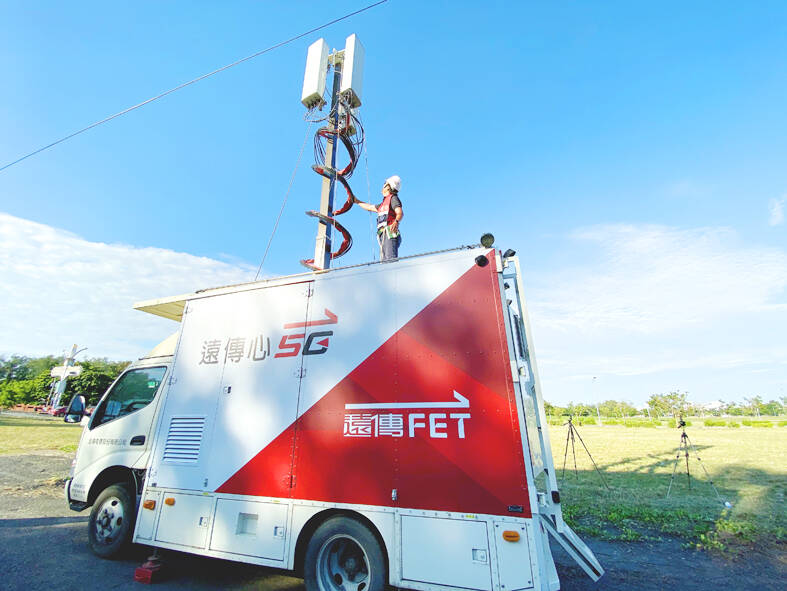Far EasTone Telecommunications Co (遠傳電信) yesterday said it is seeking to decommission at least 5,000 base stations using overlapping frequency bands with Asia Pacific Telecom Co (亞太電信) following the acquisition of the smaller telecom.
Far EasTone president Chee Ching (井琪) made the remarks on the sidelines of a forum in Taipei.
With those base stations going offline, Far EasTone would reduce carbon emissions by about 25,000 tonnes annually, Ching said.

Photo courtesy of Far EasTone Telecommunications Co
About 92 percent of Asia Pacific Telecom base stations can be integrated with the ones operated by Far EasTone, the company said.
Far EasTone is likely to scrap another 12,000 3G base stations, as a timeframe set by the National Communications Commission stipulates that 3G networks be shut down next year.
Commission data show that each telecom would reduce their electricity use by up to 100 million kilowatt-hours per year by shutting down 3G stations.
Far EasTone said that base stations contribute 75 percent to its power consumption, so reducing their number would contribute greatly to its electricity saving plans.
Data centers and servers account for 23 percent of power consumption, while office buildings and retail stores account for 2 percent, it said.
Far EasTone expects to complete the merger with Asia Pacific Telecom as early as the third quarter of this year, saying that it would create NT$3 billion (US$98.3 million) in synergy benefits within one year of the merger.
Most of the benefits would come from cost saving measures through integrating the two base station ecosystems and spectrum sharing, it said.
The merger is subject to approval by the Fair Trade Commission, after the National Communications Commission conditionally approved the deal in the middle of January.

CHIP RACE: Three years of overbroad export controls drove foreign competitors to pursue their own AI chips, and ‘cost US taxpayers billions of dollars,’ Nvidia said China has figured out the US strategy for allowing it to buy Nvidia Corp’s H200s and is rejecting the artificial intelligence (AI) chip in favor of domestically developed semiconductors, White House AI adviser David Sacks said, citing news reports. US President Donald Trump on Monday said that he would allow shipments of Nvidia’s H200 chips to China, part of an administration effort backed by Sacks to challenge Chinese tech champions such as Huawei Technologies Co (華為) by bringing US competition to their home market. On Friday, Sacks signaled that he was uncertain about whether that approach would work. “They’re rejecting our chips,” Sacks

Taiwan’s long-term economic competitiveness will hinge not only on national champions like Taiwan Semiconductor Manufacturing Co. (TSMC, 台積電) but also on the widespread adoption of artificial intelligence (AI) and other emerging technologies, a US-based scholar has said. At a lecture in Taipei on Tuesday, Jeffrey Ding, assistant professor of political science at the George Washington University and author of "Technology and the Rise of Great Powers," argued that historical experience shows that general-purpose technologies (GPTs) — such as electricity, computers and now AI — shape long-term economic advantages through their diffusion across the broader economy. "What really matters is not who pioneers

BUBBLE? Only a handful of companies are seeing rapid revenue growth and higher valuations, and it is not enough to call the AI trend a transformation, an analyst said Artificial intelligence (AI) is entering a more challenging phase next year as companies move beyond experimentation and begin demanding clear financial returns from a technology that has delivered big gains to only a small group of early adopters, PricewaterhouseCoopers (PwC) Taiwan said yesterday. Most organizations have been able to justify AI investments through cost recovery or modest efficiency gains, but few have achieved meaningful revenue growth or long-term competitive advantage, the consultancy said in its 2026 AI Business Predictions report. This growing performance gap is forcing executives to reconsider how AI is deployed across their organizations, it said. “Many companies

TAIWAN VALUE CHAIN: Foxtron is to fully own Luxgen following the transaction and it plans to launch a new electric model, the Foxtron Bria, in Taiwan next year Yulon Motor Co (裕隆汽車) yesterday said that its board of directors approved the disposal of its electric vehicle (EV) unit, Luxgen Motor Co (納智捷汽車), to Foxtron Vehicle Technologies Co (鴻華先進) for NT$787.6 million (US$24.98 million). Foxtron, a half-half joint venture between Yulon affiliate Hua-Chuang Automobile Information Technical Center Co (華創車電) and Hon Hai Precision Industry Co (鴻海精密), expects to wrap up the deal in the first quarter of next year. Foxtron would fully own Luxgen following the transaction, including five car distributing companies, outlets and all employees. The deal is subject to the approval of the Fair Trade Commission, Foxtron said. “Foxtron will be